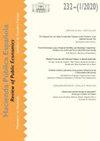欧元真的加剧了欧元区的腐败吗?反事实分析
IF 0.5
4区 经济学
Q3 ECONOMICS
Hacienda Publica Espanola-Review of Public Economics
Pub Date : 2023-03-01
DOI:10.7866/hpe-rpe.23.1.1
引用次数: 0
摘要
在本文中,我们采用Abadie, Diamond和hainmeller(2010)开发的综合控制方法来评估采用欧元对欧元区三组国家(核心,南部和东部国家)腐败的影响程度。为此,我们为每个群体和每个国家构建反事实,并将其与腐败控制指标的实际演变进行比较。除了荷兰的情况,在那里发现了显著的负面影响,我们发现证据表明,采用欧元要么有助于减少腐败,要么没有显著影响。本文章由计算机程序翻译,如有差异,请以英文原文为准。
Did the Euro Really Increase Corruption in the Eurozone? A Counterfactual Analysis
In this paper we apply the Synthetic Control Method developed by Abadie, Diamond and Hainmüeller (2010) to assess the extent to which the adoption of the euro has affected corruption in three groups of Eurozone countries: the core, southern and eastern countries. To do so, we construct counterfactuals for each group and for individual countries and compare them with the actual evolution of the corruption-control indicator. Except in the case of the Netherlands, where significant negative effects are detected, we find evidence that the adoption of the euro has either contributed to reducing corruption or has not affected it significantly.
求助全文
通过发布文献求助,成功后即可免费获取论文全文。
去求助
来源期刊

Hacienda Publica Espanola-Review of Public Economics
Economics, Econometrics and Finance-Finance
CiteScore
0.90
自引率
14.30%
发文量
14
期刊介绍:
Hacienda Pública Española/Review of Public Economics welcomes submissions on all areas of public economics. We seek to publish original and innovative research, applied and theoretical, related to the economic analysis of Government intervention. For example, but not exclusively: Taxation, Redistribution, Health, Education, Pensions, Governance, Fiscal Policy and Fiscal Federalism.
In addition to regular submissions, the journal welcomes submissions of:
-Survey Reviews, containing surveys of the literature regarding issues of interest in the Public Economics field;
-Policy oriented reviews, showing the current contributions of Public Economics in relation to relevant contemporary issues affecting public decision-makers in the real world (Policy Watch);
-Comments of previously published articles. Contributions to this section should be limited to a maximum of 2 000 words (12 pages). If deemed adequate, the authors of the commented article will be given the opportunity to react in a Reply. Both Comment and Reply will be published together.
Articles for the Survey Reviews and Policy Watch section are subject to the same double blind reviwing procedure. The adequacy of Comments submitted for publication will be evaluated by the Executive Editors.
 求助内容:
求助内容: 应助结果提醒方式:
应助结果提醒方式:


